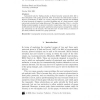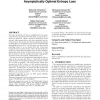121 search results - page 15 / 25 » Identity-based key agreement protocols from pairings |
JAR
2006
13 years 7 months ago
2006
Automated tools for finding attacks on flawed security protocols often fail to quately with group protocols. This is because the abstractions made to improve performance on fixed ...
STOC
2005
ACM
14 years 7 months ago
2005
ACM
A celebrated 1976 theorem of Aumann asserts that honest, rational Bayesian agents with common priors will never "agree to disagree": if their opinions about any topic ar...
STOC
2010
ACM
13 years 10 months ago
2010
ACM
We study the problem of "privacy amplification": key agreement between two parties who both know a weak secret w, such as a password. (Such a setting is ubiquitous on th...
ACISP
2010
Springer
13 years 9 months ago
2010
Springer
To reduce the damage of phishing and spyware attacks, banks, governments, and other security-sensitive industries are deploying one-time password systems, where users have many pa...
TCC
2007
Springer
14 years 1 months ago
2007
Springer
Assume that two distant parties, Alice and Bob, as well as an adversary, Eve, have access to (quantum) systems prepared jointly according to a tripartite state ρABE. In addition, ...


